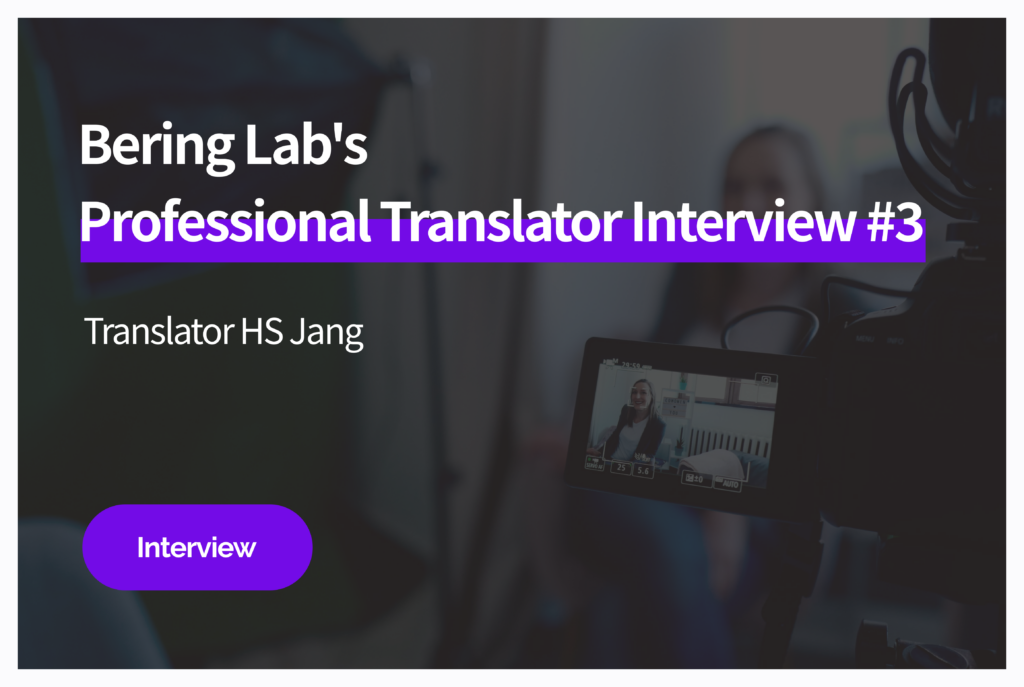“Few translation companies possess the level of legal translation expertise that Bering Lab does!“
Today, we introduce an interview with HS Jang, a translator at Bering Lab who has a background in law both in Korea and the USA. HS Jang studied Computer Science and Law in the USA and has gained extensive expertise in various legal documents through his work as an attorney in both the USA and Korea.
Let’s explore the story of HS Jang at Bering Lab, who primarily handles the translation of various technical and legal documents. 😊
Q. What are your main responsibilities at Bering Lab currently?
A. I’m primarily responsible for ‘translation tasks’ and ‘evaluating translators’ tests.’ My translation work mostly involves legal and technical documents, including autonomous driving, technology-related patent documents, and scholarly papers, translating them from Korean to English.
Q. What experiences did you have before joining Bering Lab?
A. I majored in Computer Science, specifically in databases during my undergraduate years. After realizing it wasn’t the right fit for me (laughs), I went to law school in New Jersey. After graduating, I worked as an attorney in New Jersey for a year and later, at Yulchon Law Firm in Korea, where I conducted research on US and international law and translated legal documents.

Q. It seems that your background in Computer Science and Law would be quite beneficial as a professional translator.
A. Yes, that’s correct. My background in Computer Science has been incredibly helpful in translating various technical documents because deep knowledge of the subject matter is essential to accurately convey the original intent of the texts. Additionally, my experience in Law and working as an attorney has been invaluable for translating legal documents, especially given the fundamental differences between the legal systems of Korea and the USA. Sometimes, there are no direct translations for legal terms between the source and target languages, which complicates direct translation and makes my legal background particularly useful.
Q. It seems you’ve had extensive experience living abroad. How has this impacted your translation work?
A. I moved to the USA when I was four years old. After living in Korea for about two to three years in between, I’m now based in the USA again. Thanks to my parents, we mostly spoke Korean at home, which helped me become fluent in both Korean and English. This bi-cultural and bilingual background is incredibly beneficial in professional translation. Understanding the source document is crucial, but knowing the target language well is equally important. Growing up in the USA has significantly aided my ability to translate from Korean to English.

Q. Can you share about any recent translation projects you’ve worked on?
A. Recently, I translated documents related to a ‘patent infringement lawsuit’ for a pharmaceutical company. I am working on documents that involve both international and Korean patent litigation issues. In patent translation, every single word is crucial as a patent defines rights based on the specific words, terms, and phrases it employs. As translators, we cannot afford to interpret freely; accurate translation is essential to avoid significant legal errors.
Q. Over the years working with Bering Lab, you must have handled a variety of translation tasks. Could you share a memorable one?
A. I’ve worked on a variety of documents, but one that stands out is a ‘judgment’ document. In Korea, some judges write incredibly long sentences that can extend over an entire page. These sentences are technically one sentence in Korean but can fill more than a page, so just understanding them completely is challenging. Translating them into English with correct grammar and structure was particularly difficult.
Q. As a translator, what do you consider the most important aspect of your job?
A. I believe it’s crucial to align the nuance and essence of the original document in professional translation. Personally, I adhere to the principle that ‘a translation that is merely literal is still incorrect if it distorts the original meaning.’ Even if a translation seems correct on a superficial level, if it doesn’t preserve the original’s intent, it’s considered incorrect. Preserving the original’s intent is more important than just translating words accurately.
Q. Besides translation work, you also handle translator evaluations. What do you focus on in these assessments?
A. First and foremost, I believe that translations must be error-free, regardless of the translator’s English proficiency. Fundamental mistakes or poorly translated sentences pose the biggest issues, so error detection is my top priority. Secondly, I look at how well translators understand English grammar. For translations from Korean to English, understanding Korean is crucial, but without a deep understanding of English grammar, the original intent and phrasing cannot be accurately conveyed.
Q. Bering Lab also operates the Bering AI Translator service to help translators save resources. How do you use it in your translation work?
A. In practice, Bering AI Translator is not only helpful in our current workflow, but I think it has a lot of potential in the future. We’re actually saving a lot of resources by using Bering AI to do initial translations of large documents or documents with repetitive terms. Of course, the context of the underlying document needs to be reviewed by a professional translator, so being able to save resources with Bering AI gives us more time to focus on our specialty as translators, such as context and nuance.
Q. Finally, what would you like to tell users about how Bering Lab’s service is different from other translation services?
A. I think the biggest advantage of Bering Lab is its specialization, because most translation companies don’t deal with specialized documents like Bering Lab does. They don’t focus on specialized specific documents, so they are mainly composed of freelance translators, but Bering Lab has a lot of full-time translators, and the quality of their work is much higher because they have actual experience in the specialized field.
Bering Lab offers a variety of business and legal document translations through its BeringAI and BeringAI+ services, which combine high-performance AI with expert reviews to save resources and provide services that are three times faster and 40% cheaper than competitors.
Currently, over 130 law firms both domestically and internationally, along with various global corporations, actively use our services.
Experience the high-quality professional translation of Bering Lab, trusted by the nation’s top law firms, with documents directly reviewed by attorneys. Contact Bering Lab for more information.
🚀 Inquire about our more sophisticated and high-quality translation service, BeringAI+


